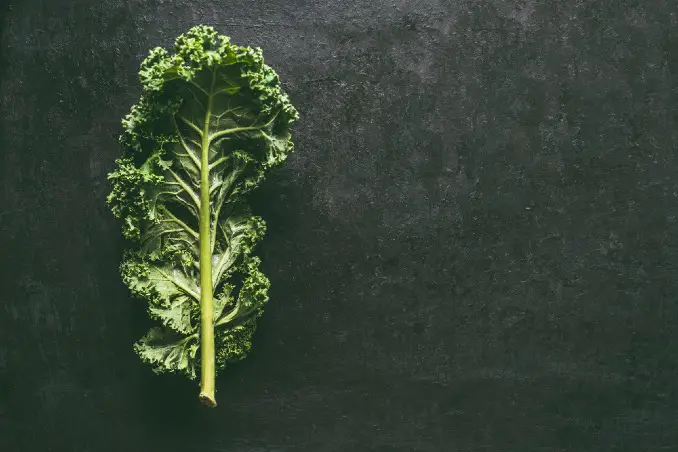Your brain is like a race car – it’s fast, powerful, and needs good fuel to run properly!
Even though it only weighs 1400g, the human brain consumes over 20% of the body’s energy budget. (1) Feeding it with the right foods can make all the difference in how you feel and perform in your personal and work life.
Brain food Review
If you aren’t careful about what you eat, you may not notice the consequences right away. But over time, it’s been shown that oxidative stress and inflammation that are in part caused by an unhealthy lifestyle can slowly chip away at your brain – leading to cognitive decline and brain fog.
Weaving some of the following foods into your menu can help you keep a sharp brain regardless of your age.
Kale – Brain food
Kale is the king of nutrient-dense foods. It contains a heap ton of vitamins and minerals that boost your brain health. One of these is magnesium – it promotes neuron to neuron communication, raises your feel good brain chemicals, and relaxes the nerves. One cup of kale will nourish you with these nutrients:
- 206% of your daily requirement for vitamin A
- 684% of vitamin K
- 134% of RDI for vitamin C
- Antioxidants such as kaempferol and quercetin that reduce inflammation in the brain. (5)
Eggs
Eggs are packed with choline. This is an essential brain nutrient that helps build and repair neurons. Choline improves your memory, mood, and cognition.
In addition, choline helps your brain:
- Produce neurotransmitters – choline is a building block for acetylcholine, a neurotransmitter that regulates your memory, thought, learning, and muscle function. Choline also boosts dopamine, the so-called pleasure molecule. (6, 7)
- Repair brain cells – choline is used by your brain to produce uridine and PC (phosphatidylcholine). PC is a phospholipid which encases the outer layer of your brain cell membrane. Why is this important? Because without enough PC, your neurons lose integrity, nerve signals diminish, and cognitive decline ensues. Choline helps rebuild PC and your neurons, keeping them firing on all cylinders. Literally. (8, 9)
- Improve energy: Pretty much everyone has experienced brain fog and mental fatigue once or twice in their life. Not a nice feeling, right? Well, choline helps prevent brain fog and mental fatigue by improving ATP production in brain cells. ATP, also called Adenosine triphosphate, is the energy currency of your cells.
Just one egg contains about 115mg of choline. That’s around 30% of your choline daily requirement. (12)
In addition to choline, eggs also contain the B group vitamins.
Vitamin B12 is especially important for your brain since it’s involved in the production of neurotransmitters and glucose uptake in the brain. (13)
Glucose is your brain’s primary fuel; when the brain is better able to utilize it, you’ll think clearer and sharper.
Sardines
Fish are the epitome for brain food.
Sardines and other fatty fish are nature’s best source of omega-3 fatty acids.
- Your brain is about 60% fat, and most of that fat is DHA, an omega-3 fatty acid.
DHA in fish helps your brain build new neurons. (14)
In fact, studies show that people who eat more fish have denser grey matter in their brains. (15)
Sardines are also rich in B vitamins which are critical for brain function.
And on top of it, sardines are low on the food chain meaning they are low in mercury.

Blueberries
Blueberries are arguably the best fruit for your brain.
They contain anthocyanins, a group of antioxidants which reduce inflammation and damage to brain cells. (16)
- Some antioxidants in blueberries are shown to accumulate in your brain cells.
As a result, they protect long-term memory and cognition. (17)
Research suggests that older people who eat blueberries show better overall memory and cognition. (18)
Walnuts
Studies show that nuts improve brain performance and reduce the risk of developing a neurological disease later in life. (19) One study found that women who included nuts in their diet had a better memory compared to those that didn’t consume nuts.
(20) Nuts provide you with a hefty dose of vitamin E, a free radical scavenger which protects your brain cells (and other cells for that matter) from oxidative stress. (21)
- Out of all nuts, walnuts have the edge due to their high omega-3 fatty acid content. These are used as building blocks for your brain. Brain food in full sense of the word. (22)
Flaxseeds
One tablespoon of flaxseeds contains around 1,600mg of omega-3s in the form of ALA. (23) Your body converts this ALA into EPA and DHA, the two main omega-3 fatty acids linked to most brain benefits. If you don’t eat fish, then flaxseeds might just be your best option of getting those brain-nurturing omega-3s in your diet. (23)
Salmon
Salmon, just like sardines, is the epitome of brain food. The type of omega-3s found in salmon is mostly EPA and DHA. DHA is essential for your brain since it helps build neurons and cell membranes. Critical for vivid memory, clear thinking, and sharp focus. (14, 15) Not only that, omega-3s such as EPA and DHA are shown to enhance serotonin (the happy chemical) in the brain. (26)
Coffee
Your brain loves coffee as much as you do.
There are two main compounds in coffee that boost your brain function – caffeine and antioxidants.
These two compounds offer benefits such as (27):
- Sharper focus – A study has found that one large coffee in the morning can significantly boost your concentration and task performance. The same effect was seen in those who drank smaller amounts of coffee throughout the day. (28)
- Enhanced alertness – Caffeine works by blocking adenosine in your brain. Adenosine is a brain chemical that makes you drowsy and sleepy. When your levels of adenosine are low, you’re able to stay alert and aware of your surroundings. (29)
- Elevated mood – We all know that joyous feeling from smelling your first cup of coffee in the morning. After drinking it, you’re even happier! It turns out, there’s a good reason for this – coffee boosts neurotransmitters such as dopamine and serotonin, which make you feel good. (30)
Alongside these benefits, coffee is also shown to reduce the risk of cognitive decline, Alzheimer’s, and Parkinson’s. (27)
Most of the credit here goes to antioxidants in coffee. These protect your brain from oxidative stress and neuron damage.
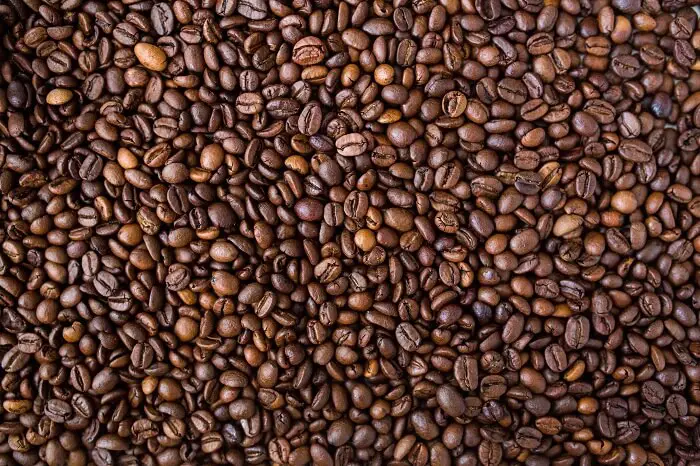
Turmeric
Turmeric is one of the most popular Indian brain food. It’s what gives curry spice its distinctive aroma and flavor.
Turmeric has many benefits for your brain. But three, in particular, stand out (31):
- Boosts brain cell growth: Turmeric, or rather, its active ingredient curcumin, is shown to boost BDNF. Or else called brain-derived neurotrophic factor. This is a type of growth hormone which stimulates the growth of new neurons. Because of this, you could say that turmeric literally makes you smarter. (32)
- Benefits your memory: Curcumin helps improve memory, especially in people with cognitive decline and Alzheimer’s. One of the hallmarks of Alzheimer’s is the amyloid plaque in the brain – and turmeric clears it up. (31)
- Reduces Depression & Anxiety: Turmeric enhances dopamine and serotonin, two key neurotransmitters for your mood. A study found that turmeric was as effective in easing depression symptoms as a prescription antidepressant when taken long-term. (33, 34)
Dark Chocolate
Dark chocolate contains flavonoids, antioxidants, and caffeine – all of which improve your brain performance.
Caffeine is a known brain stimulant. It blocks adenosine receptors which make you feel sleepy. As a result, your cognition and mental sharpness improve.
As for flavonoids, these belong to a family of powerful antioxidants which protect the brain.
And how do they protect it?
The answer is, by disarming harmful free radicals.
What’s more, these flavonoids accumulate in your brain. (35, 36)
Especially in areas linked to your memory and learning.
Studies show that people who eat dark chocolate perform better in mental tasks. This includes memory, learning, word recall, and cognition across all boards. (37)
The conclusion is: flavonoids in dark chocolate help your brain stay sharp and young as you age.
But we’re not done yet.
Other research suggests that dark chocolate can boost mood, too. (38)
It stimulates the release of endorphins and dopamine which link to feelings of pleasure and reward.
That’s why you feel that slightly euphoric feeling after taking a bite of dark chocolate.
Broccoli
Here’s the thing with broccoli:
It’s rich in vitamin K, a nutrient that gets too little recognition.
- See, vitamin K is essential for the formation of sphingolipids. These are fatty acids which build up a large chunk of your neuron membranes. (39)
When you have enough sphingolipids, your brain cells are able to fire signals to each other fast.
Clinical evidence proves this, too.
In a study with older adults, those who ingested higher amounts of vitamin K had better cognition compared to those who lacked vitamin K in their diet. (40)
The study showed that people who ate lots of broccoli, and other vitamin K-rich foods, had a sharper memory. (41)
Just one cup of broccoli (90ish grams) will give you more than 100% of your daily vitamin K intake. (42)
Alongside vitamin K, broccoli is also a source of anti-inflammatory compounds.
And antioxidants.
The reason why these are important for your brain is simple:
They protect from the damage caused by free radicals and oxidative stress. (43)
Pumpkin Seeds
Pumpkin seeds are filled with natural antioxidants that prevent free radicals from damaging your body. (44)
These seeds are also a rich source of minerals – including magnesium, iron, copper, and zinc. (45)
And as chance would have it, all of these nutrients are important for your brain:
- Magnesium – Magnesium is involved in countless enzymatic processes, including learning and memory. A deficiency in magnesium links to neurological issues such as depression, irritability, and insomnia.
- Zinc – just like magnesium, zinc is an essential mineral which is important for your brain. It boosts nerve signaling and improves the fluidity of thought. By contrast, a chronic deficiency in zinc is shown to contribute to the development of Alzheimer’s and Parkinson’s.
- Iron – low iron levels will make every day a struggle. You’ll feel brain fog, fatigue, and lack of zest for pursuing your goals. That’s why having optimal levels of this mineral is crucial for your brain performance.
- Copper – Copper is an essential part of nerve signaling in your brain. When copper levels get low, you can develop neurodegenerative diseases – including Alzheimer’s.
Raw Milk
If you’ve been told that pasteurized milk is safer or healthier than raw milk, then this might come as a shock.
But the truth is, raw milk is incredibly nutritious.
Raw milk can significantly reduce allergies and asthma along with boosting the immune system. (48, 49, 50)
If it comes from cows that are properly fed and cared after, raw milk is full of digestive enzymes and beneficial probiotic bacteria.
You have a 35,000-time higher chance of getting sick from other foods than from raw milk. (46)
About 48 million food poisoning cases are reported every year. Only about 42 of those are due to drinking fresh, raw milk. That’s 0,0005%! (47)
What’s more, raw milk naturally ferments when left out open – it doesn’t spoil.
This is due to beneficial bacteria in raw milk that keep bad bacteria at bay.
Pasteurized milk doesn’t have any good bacteria left in it.
As a result, it becomes putrid when left out in the open for too long.
If you drink putrid pasteurized milk, you can get sick.
But what’s about the brain benefits?
How does raw milk exactly help your brain?
Well, as we said, it provides a plethora of good bacteria that support your gut health.
And a healthy gut means a healthy brain.
Over 90% of all serotonin is found in your gut.
Additionally, your gut communicates with your brain via the ‘gut-brain axis’, which includes the vagus nerve.
It’s no news that your intestinal microflora influences your mood and cognitive function. (51, 52)
Some strains of probiotics have even shown to treat depression and anxiety – via the gut! (52)
And raw milk is one of the best sources of probiotics out there – especially when it ferments and turns into kefir or yogurt.

Raw Honey
Raw honey is one of the most soothing foods there is.
Brain benefits of honey include:
- Enhanced sleep – Honey helps improve the absorption of L-tryptophan, an amino acid which later turns to serotonin in the brain.
Serotonin, in turn, converts to melatonin, the sleep hormone. Many people report how taking raw honey before bed helps them sleep.
- Better mood – An additional benefit of elevated L-tryptophan and serotonin levels is improved mood. This comes as no surprise since serotonin is the key neurotransmitter for mood and happiness.
Mood disorders such as anxiety and depression are often linked to low serotonin levels. (92, 93) Honey hops in here and says, “Nope! Ain’t gonna happen anxiety! Not today!” and provides the tryptophan needed for serotonin synthesis.
- Brain protection – honey contains a wide range of antioxidants which protect brain cells from free radical damage. (53)
A study review published by the Department of Biochemistry and Molecular Biology, Jahangirnagar University showed that honey not only reduces oxidative stress.
It also restores your body’s natural antioxidant system. (54)
In addition, the research showed that polyphenols in honey reduce inflammation in the brain. Which leads to improved memory.
Quoting the research:
““Raw honey possesses nootropic effects, such as memory-enhancing effects, as well as neuropharmacological activities, such as anxiolytic, antinociceptive, anticonvulsant, and antidepressant activities. Honey polyphenols are useful in improving memory deficits and can act at the molecular level.”
Coconut Oil Brain food
Coconut oil contains medium-chain fats called MCT fatty acids.
MCTs are shorter than other types of fats.
As a result, they are quickly converted by the liver into your brain’s favorite fuel source – ketones.
When your brain runs on ketones, your cognition, mood, and overall brain performance improve. (55)
You can gain some of these benefits by taking 1-3 tablespoons of coconut oil throughout the day.
Just make sure to take extra-virgin or virgin coconut oil. Refined coconut oil loses most of its benefits due to high-heat processing.
Green Tea
Green tea is one of the healthiest beverages there is.
It’s loaded with antioxidants, which are essential for the brain as well as general health.
Green tea also contains some caffeine. Not as much as coffee, but enough to keep you alert.
I know what you’re saying right now…
„But I don’t want any caffeine! It gives me anxiety.“
Worry not, I’m here to tell you that green tea won’t make you anxious. That’s because alongside caffeine, green tea also contains something called L-theanine.
L-theanine is an amino acid which soothes the mind.
Once it enters the brain, l-theanine boosts GABA production. GABA is a neurotransmitter that calms anxiety and racing thoughts. (56)
L-theanine also raises dopamine and alfa-brain waves. These are linked to feelings of peace and joy. (57)
When drinking green tea, you get the best of both worlds from caffeine and l-theanine.
While caffeine gives you a slight energy boost and mental sharpness, l-theanine keeps you peacefully alert without the crash or jitters.
Avocados
Avocado’s benefits include (58):
- Rich in monounsaturated fat – these kinds of fat contribute to healthy blood flow. The healthier your blood flow is, the healthier your brain will be. It’s that simple.
- Reduce the risk of cognitive decline – Avocados have a positive effect on your blood pressure, helping it keep stable. High blood pressure is shown to cause cognitive decline.
Alongside these benefits, avocados are a nutrient-dense food.
They contain a plethora of vitamins and nutrients that support brain function and help keep your cognitive abilities sharp. (59)

Kefir
Yogurt might be the most popular probiotic food.
But the true king of milk-based probiotics is kefir.
You see, kefir contains even more friendly probiotic bacteria than yogurt.
Your gut is happy when you eat kefir.
And your brain benefits too, thanks to the gut-brain connection.
Certain strains of probiotics, like Bifidobacterium, are shown to alleviate anxiety and depression. (60)
Adding kefir to your diet is a great way of reaping these benefits.
Beet Root
Beetroot is not only packed with antioxidants. It also contains nitrates which boost your blood flow to the brain. (61, 62)
If you’ve looked at some of the other foods on this list, then you know that your brain thrives when it has a constant supply of nutrients, oxygen, and glucose via blood.
And beetroot is one of the best foods to help in this regard.
Beans
Beans aren’t just a great source of plant protein.
They also have plenty of nutrients that nurture your brain, including folate and magnesium.
Also known as vitamin B9, folate is critical for your cognitive function. (65)
It helps with the synthesis of the myelin sheath, a fatty layer that encases and protects your nerves.
What’s more, folate is crucial for the synthesis of neurotransmitters, including:
- Dopamine
- Serotonin
Dopamine is a reward chemical. It makes you feel motivation and pleasure.
Serotonin, on the other hand, is responsible for feelings of peace and happiness. It also regulates your appetite and sleep.
Last but not least, we have magnesium. A nutrient that’s critical for your memory, mood, and cognition.
Almond Butter
Almonds have a lot of vitamin E.
Vitamin E is an antioxidant. Your brain uses it to fight aging and oxidative stress.
Let’s look at what the experts say about vitamin E:
A large study tested the effects of vitamin E supplementation on over 2800 healthy elderly women.
The trial lasted for three years.
During this period, the researchers wanted to see if long-term vitamin E supplementation could help with cognitive decline.
And it did.
The results showed that women who consumed higher amounts of vitamin E had “less cognitive decline with age”. (63)
What’s more, research implicates that vitamin E can help protect against Alzheimer’s. (64)
All in all, it’s a critical nutrient for your brain, and almond butter’s got plenty of it.
Strawberries
Strawberries can boost your brain health in a number of ways:
- Strawberries are rich in polyphenols – these include anthocyanins, quercetin, kaempferol, and ellagic acid. Why are these important, you ask? Well, polyphenols have strong antioxidant activity, meaning they make your brain more resilient to stress.
What’s more, antioxidants in strawberries are shown to prevent cognitive decline. (66)
- Strawberries suppress inflammation – research suggests that strawberries reduce inflammation in your body. Inflammation is a huge indicator of a disease, not just in terms of brain health but also every other organ.
The way strawberries achieve this is by inhibiting COX enzymes, which are linked to inflammation. (67)
- Strawberries keep your brain young and sharp – It’s no secret that flavonoids, such as those found in strawberries, help maintain optimized brain even into old age. (68)
These flavonoids boost antioxidant activity in the brain and protect it from damage. They also increase nutrient delivery through blood and reduce plaquing of your blood vessels – contributing to healthy blood flow to the brain.
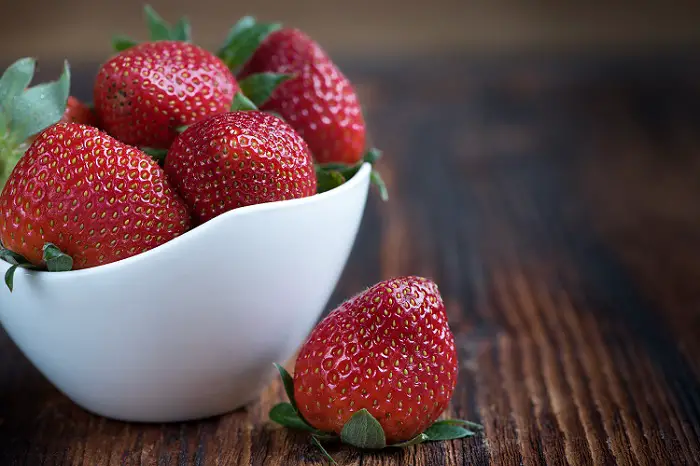
Yogurt
Numerous studies show the beneficial effects of probiotics such as yogurt on your brain.
And it all beings with your gut.
In the gut, you have over 100 trillion living organisms. Some are good, some are bad.
By eating foods like yogurt, you can significantly shift the tides in favor of your good bacteria. (69)
And your brain will thank you for it.
When there’s a balance in your gut microbiome, your body is able to produce enough serotonin, the happiness brain chemical.
This in turn can reduce anxiety and depression. While boosting mood and well-being.
To quote a PubMed study review (69):
“Probiotics could alleviate depressive symptoms by activating tryptophan metabolism in the serotonergic system.”
Spinach
When you think of spinach, Popeye and big muscles may come to mind.
But spinach doesn’t just pump up your muscles – your brain loves it too.
It’s rich in vitamin K, a nutrient that you’ll find in many other leafy green vegetables, including kale.
And according to research, eating vitamin K-rich foods such as spinach is vital for creating sphingolipids which are critical for good memory and preventing cognitive decline. (70)
Chilli Peppers
Peppers, in general, are great for your brain.
They contain luteolin, a type of flavonoid which reduces inflammation and helps maintain a healthy memory. (71)
However, chili peppers offer additional benefits.
Capsaicin, the compound in chili peppers that makes them ‘hot’, triggers a release of feel-good chemicals in your brain – including dopamine. (72)
Dried Fruit
Dried fruit, especially raising, are a source of boron.
This is a trace mineral that USDA suggests may be getting too little of our recognition.
A study found that people taking 3.2 or more milligrams of boron per day had 10% better memory and attention, on average. (73)
Besides raisins, foods that contain boron include:
- Apples
- Nuts
- Almonds
- Hazelnuts
Turkey
Turkey contains amino acids such as tyrosine and l-tryptophan, which are building blocks for neurotransmitters.
[RELATED: 11 Foods High in L-Tryptophan]
While tyrosine supports the production of dopamine, a brain chemical that boosts motivation and memory, l-tryptophan may help increase serotonin levels in the brain, which translates to elevated mood.
And tyrosine can help with your cognition, too.
Researchers from the U.S. Military found that soldiers who consumed tyrosine-rich food did better on memory and multitasking tests than those who didn’t eat foods with tyrosine. (74)

Oats
Oats contain plenty of fiber which can help lower your cholesterol levels. And thus, help maintain cardiovascular health.
You might ask, how does this relate to brain health?
The answer is simple: when your cardiovascular system is working optimally, your brain gets a constant supply of oxygen, blood, and nutrients it needs.
In addition, oats have vitamins B and E, along with minerals such as magnesium.
Guess what?
All of these nutrients are essential if you want your brain working at its peak.
Grass-Fed Beef
Grass-fed beef helps you stay cognitively sharp, it improves your memory, and can even boost your mood.
A study from Switzerland gave men three different types of breakfast:
- A high-protein meal
- A high-carb meal
- A meal with both carbs and protein
After having their meal, these men went on to take a memory test.
The goal of the study was to see the effect of each meal on the memory of these people.
As it turned out, those who ate a high-protein meal in the form of beef got the highest scores in the memory test.
And this comes as no surprise, according to the study’s lead author, Karina Fischer, Ph.D.
She says how protein-rich meals, like grass-fed beef, contain amino acids phenylalanine and tyrosine, which are essential for cognitive performance. (75)
What we can take from this study is, eating high-quality protein foods such as grass-fed beef can help boost your memory – and make your taste buds happy.
Not only that, tyrosine is a precursor to dopamine. Dopamine is a brain chemical critical for good mood, motivation, and feelings of well-being.
Lentils for Brain food
Lentils are packed with fiber, meaning they improve your digestion and reduce blood pressure.
Healthy digestion means healthy gut, and we know the importance of the gut-brain axis for your mood. (52)
But how do lentils improve digestion?
Well, for one, they feed the friendly bacteria in your gut.
See, the fiber in lentils is the perfect food for your gut microbiome. It allows the good bacteria to grow and thrive in its environment – while stopping the ‘bad’ bacteria from getting out of control.
Some of these strains of good bacteria are even shown to help with anxiety and depression. (60)
Not to mention that lentils help reduce your blood pressure. Which is great for your brain because high blood pressure is often tied with brain fog.
Swiss Chard
It’s hard to find a nutrient that Swiss Chard doesn’t have.
It’s full of vitamins, minerals, and phytonutrients, which include brain-protecting antioxidants.
For example, Swiss Chard contains plenty of vitamin C. It is a powerful antioxidant which scavenges free radicals that can otherwise damage the brain cell. (76)
Swiss Chard also has betalains – a special type of antioxidant which protects the neuron membrane from damage typically seen in Alzheimer’s Disease. (77)
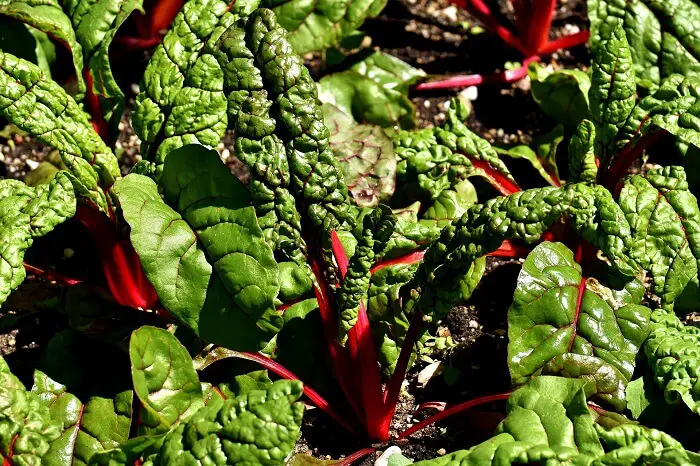
Celery
When you think of celery, the term ‘brain food’ probably isn’t the first thing that crosses your mind.
However, as it turns out, Celery contains luteolin, which can enhance your memory.
Luteolin belongs to the class of flavonoids.
It’s potent at reducing inflammation, including in the brain, which helps against age-related cognitive decline and memory issues. (78)
Luteolin also increases your GABA activity, which in turn makes you feel calm and relaxed. (94)
Tomatoes
Lutein is a popular antioxidant that’s typically used for protecting eye health.
But according to a 2016 American study, it can also help protect your brain. (79)
The study showed how lutein helps maintain brain performance as you age. In other words, it protects your neurons from damage or cell death.
And as it turns out, tomatoes have plenty of lutein.
Sauerkraut
Just like other probiotic foods on this list, sauerkraut contains countless friendly bacteria.
These not only heal your gut but also improve brain health via the gut-brain axis. (80)
Some of the benefits of sauerkraut include:
- Improves mood (enhanced serotonin and GABA)
- Reduces inflammation
- Bolsters the immune system
Sunflower Seeds
Containing vitamin E, sunflower seeds are shown to improve memory and prevent cognitive decline as you age. They are brain food in full sense of the word. (81)
Red Wine – Brain food
It’s true – you can drink your way to mental sharpness.
Research points out that red wine has protective effects on your brain, helping it stay sharp as you age.
See, red wine contains resveratrol. Which is thought to increase lifespan due to its antioxidant properties.
However, one study showed that resveratrol can also protect your brain cells from damage. (82)
And another study showed that people who drink just one glass of red wine a day have a 23-percent lower risk of cognitive decline compared to those that don’t drink. (83)
Now, as with everything, and more so with alcohol, you should keep it in moderation.
Because too much will have the opposite effect on your cognitive function – impairing it and possibly leaving long-term health consequences.

Asparagus for Brain food
Asparagus will provide you with vitamin B9 aka folate.
Along with protecting your brain from cognitive decline. Vitamin B9 or folate is also critical for the synthesis of neurotransmitters that regulate your mood.
B9 also helps form the myelin sheath, a protective layer of fat that encases your nerves and improves nerve signaling.
A study from the Los Angeles School of Health reported that high levels of vitamin B9 help protect the brain of seniors. The vitamin helped them perform better on various cognitive tasks. (84)
Sage as Brain food
Sage is a spice that’s shown to boost mental performance. Research from Murdoch University suggests that a sage extract improves memory, increases focus, and elevates mood. Sage achieves these powerful effects by reducing the breakdown of acetylcholine. Your brain’s ‘learning and memory’ neurotransmitter. (85)
Red Grapes
Red grapes really pack a punch when it comes to antioxidants.
The most powerful of these is resveratrol, a phenol thought to increase lifespan. The one you find in red wine, too.
Not only does it link to a longer and healthier life, but resveratrol can also aid your brain function.
A study found that eating grapes twice per day will improve your (86):
- Memory
- Attention Span
- Brain energy metabolism
Chia Seeds
Chia seeds are a source of omega-3 fatty acids.
The benefits of these essential fats – especially EPA and DHA – are evident.
As I’ve repeated, a large portion of your brain is fat. And most of it is DHA.
So by consuming chia seeds, you give your brain the building blocks for (14, 15, 26):
- Creating new neurons
- Repairing existing brain cells
- Enhancing neuron membranes – improving their permeability and fluidity, which promotes neuron signaling.
- Neurotransmitters (serotonin, GABA, etc.)
Black Tea
Black tea, just like green tea, is a powerful source of antioxidants.
These include polyphenols such as catechins and theaflavins, which protect your brain cells from damage. (87)
In addition, black tea contains L-theanine, an amino acid which boosts alpha brain waves. (56, 57)
Alpha brain waves link to states of creativity, relaxed focus, and peace.
Last but not least, l-theanine in black tea protects the neurons and enhances cognition. (57)

Goji Berries
You’d be surprised at how many mental benefits goji berries offer.
A randomized, double-blind, placebo-controlled study looked into the effects of 14 goji berries on a group of healthy adults.
These adults consumed goji berries for 14 days.
After this period, the researchers examined these people in several categories:
- General feelings of well-being
- Neurologic and psychological traits
- Musculoskeletal and gastrointestinal complaints
- Other side effects
After day 14, the study participants showed notable improvements in their quality of sleep, focus, energy levels, calmness, and feelings of happiness.
The study concluded that goji berries have a positive effect on mental health. (88)
Kimchi – Brain food
Kimchi is a fermented type of food, which means it contains friendly bacteria – probiotics. They colonize your gut and contribute to a healthy microbiome. Since your gut and brain are strongly interlinked via the gut-brain axis, a healthy gut will help you maintain peak brain performance.
Coconut Kefir
Coconut kefir is similar to milk kefir in a way that it contains healthy probiotics. However, it’s completely dairy-free. And it’s great brain food for vegetarians. Alongside supporting your gut health, probiotics such as Bifidobacterium help alleviate anxiety and depression.
Trout – Brain food
Salmon or sardines aren’t the only fish who have lots of omega-3s. Trout is another great source of these essential fatty acids. As we’ve said, a big chunk of your brain is made from DHA, an omega-3 fatty acid. By eating trout, you’ll help contribute to healthy mood and cognitive function.
Bananas – Brain food
Bananas contain l-tryptophan. This is an amino acid precursor to serotonin, the ‘happiness’ brain molecule. Alongside tryptophan, bananas also contain potassium, a mineral that plays a role in mental health.

Olive Oil
Extra-virgin olive oil is the least processed type of olive oil. And it contains healthy fatty acids that protect your brain. According to research, olive oil helps to prevent the formation of amyloid-beta plaque in your brain. This type of plaque is linked to Alzheimer’s Disease. Because of this, it’s no wonder that studies show how olive oil improves memory and protects from cognitive decline. (89)
Blackberries
Blackberries contain antioxidants that reduce inflammation in the brain. This not only improves the signaling between neurons in the brain. It also protects you from cognitive decline and memory loss. (90)
Brain food – Lemons
When life gives you lemons… use them to reduce oxidative stress in your brain. Literally. Lemons are high in vitamin C, a powerful antioxidant which protects your tissues from free radicals.
While this may not directly boost your cognition, it’s a strong insurance policy against cognitive decline later in life. (91)
Organ Meats
Organ meats are arguably the most nutritious type of food you can eat. They contain a wide range of nutrients that support your brain health. One nutrient stands above the rest, though – phosphatidylserine (PS). A vital phospholipid, PS makes up 15% of your brain’s total lipid pool.
It also improves signaling between your neurons. This translates to improved thought fluidity, memory, learning, and mood. Organ meats also contain plenty of B vitamins which are essential for many processes in the brain.
Brain food – Tuna
Tuna is another marine source of omega-3 fatty acids. By now, we know that omega-3s, especially DHA, are vital for overall brain function.
This includes your memory, mood, focus, and learning. When it comes to heavy metals, tuna has more mercury than some other fish. That’s why eating it no more than once or twice per week is where the benefits outweigh the risks.
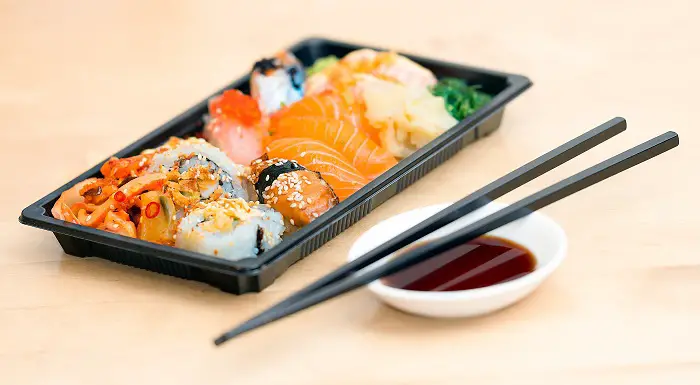
Water for Brain food
You may wonder why we’ve included water on this list. After all, it’s not really food. But the fact is, water is the basis for all processes in your body and brain.
If you’re dehydrated, it doesn’t matter how many nutrients you get, you won’t be able to fully utilize them and your cognitive function will suffer. So before you go looking for a brain supplement or food, make sure you’re well-hydrated in the first place!
Brain food Wrapping Up…
So there you have it.
It’s been a lengthy list of brain food – hope you’ve learned something from it.
Now tell me, what’s your favorite brain food?
Let me know in the comments below.
Brain food References
(1) A cellular perspective on brain energy metabolism and functional imaging. (source) (2) Self Nutrition Data – Kale. (source) (3) Therapeutic uses of magnesium. (source) (4)
Hypomagnesaemia linked to depression: a systematic review and meta-analysis. (source) (5) Composition and antioxidant activity of kale (Brassica oleracea L. var. acephala) raw and cooked. (source) (6) Changes in brain biogenic monoamines induced by the nootropic adafenoxate and meclofenoxate and by citicoline (experiments on rats). (source) (7) Cytidine(5′)diphosphocholine enhances the ability of haloperidol to increase dopamine metabolites in the striatum of the rat and to diminish stereotyped behavior induced by apomorphine.
(source) (8) Dietary uridine-5′-monophosphate supplementation increases potassium-evoked dopamine release and promotes neurite outgrowth in aged rats. (source) (9) Combined uridine and choline administration improves cognitive deficits in spontaneously hypertensive rats. (source) (10) Plasma free choline, betaine and cognitive performance: the Hordaland Health Study. (source) (11) The relation of dietary choline to cognitive performance and white-matter hyperintensity in the Framingham Offspring Cohort.
(source) (12) Dietary Reference Intakes for Thiamin, Riboflavin, Niacin, Vitamin B6, Folate, Vitamin B12, Pantothenic Acid, Biotin, and Choline. (source) (13) B Vitamins and the Brain: Mechanisms, Dose and Efficacy—A Review. (source) (14) Omega-3 Fatty Acids and their Role in Central Nervous System – A Review. (source) (15) Regular fish consumption and age-related brain gray matter loss. (source) (16) Neuroprotective effects of berry fruits on neurodegenerative diseases.
(source) (17) Recent advances in berry supplementation and age-related cognitive decline. (source) (18) Blueberry Supplementation Improves Memory in Older Adults. (source) (19) Cognition: the new frontier for nuts and berries. (source) (20) LONG-TERM INTAKE OF NUTS IN RELATION TO COGNITIVE FUNCTION IN OLDER WOMEN. (source) (21) Vitamin E and cognitive decline in older persons. (source) (22) Role of Walnuts in Maintaining Brain Health with Age.
(source) (23) Flax and flaxseed oil: an ancient cure & modern functional food. (source) (24) Alpha-linolenic acid and risk of nonfatal acute myocardial infarction. (source) (25) Novel insights into the effect of vitamin B₁₂ and omega-3 fatty acids on brain function. (source) (26) Vitamin D and the omega-3 fatty acids control serotonin synthesis and action, part 2: relevance for ADHD, bipolar disorder, schizophrenia, and impulsive behavior.
(source) (27) Effects of coffee/caffeine on brain health and disease: What should I tell my patients? (source) (28) Effects of caffeine on mood and performance: a study of realistic consumption. (source) (29) Caffeine and adenosine. (source) (30) The impact of caffeine on mood, cognitive function, performance, and hydration: a review of benefits and risks.
(source) (31) The effect of curcumin (turmeric) on Alzheimer’s disease: An overview. (source) (32) Curcumin Enhances Neurogenesis and Cognition in Aged Rats: Implications for Transcriptional Interactions Related to Growth and Synaptic Plasticity. (source) (33) Antidepressant activity of curcumin: involvement of serotonin and dopamine system.
(source) (34) Efficacy and safety of curcumin in major depressive disorder: a randomized controlled trial. (source) (35) Chocolate and the brain: neurobiological impact of cocoa flavanols on cognition and behavior. (source) (36) Epicatechin, a component of dark chocolate, enhances memory formation if applied during the memory consolidation period.
(source) (37) Chocolate intake is associated with better cognitive function: The Maine-Syracuse Longitudinal Study. (source) (38) The sweet life: The effect of mindful chocolate consumption on mood. (source) (39) Vitamin K and the Nervous System: An Overview of its Actions. (source) (40) Increased dietary vitamin K intake is associated with less severe subjective memory complaint among older adults. (source) (41) Vitamin K status and cognitive function in healthy older adults.
(source) (42) Broccoli Nutrition Facts – SelfNutritionData. (source) (43) Assessing Competence of Broccoli Consumption on Inflammatory and Antioxidant Pathways in Restraint-Induced Models: Estimation in Rat Hippocampus and Prefrontal Cortex. (source) (44) Characteristics of antioxidant activity and composition of pumpkin seed oils in 12 cultivars. (source) (45) SelfNutritionData – Pumpkin Seeds. (source) (46) http://www.realmilk.com/bios/ted-beals/
(source) (47) CDC – Raw Milk Questions and Answers. (source) (48) The protective effect of farm milk consumption on childhood asthma and atopy: The GABRIELA study. (source) (49) Got milk? Understanding the farm milk effect in allergy and asthma prevention. (source) (50) A systematic review and meta-analysis of the effects of pasteurization on milk vitamins, and evidence for raw milk consumption and other health-related outcomes. (source) (51) The Brain-Gut-Microbiome Axis.
(source) (52) Gut microbiota’s effect on mental health: The gut-brain axis. (source) (53) Novel Insights into the Health Importance of Natural Honey. (source) (54) Neurological Effects of Honey: Current and Future Prospects. (source) (55) Coconut oil and palm oil’s role in nutrition, health and national development: A review. (source) (56) L-theanine, a natural constituent in tea, and its effect on mental state. (source) (57) The neuropharmacology of L-theanine(N-ethyl-L-glutamine): a possible neuroprotective and cognitive enhancing agent. (source) (58) Eat Smart for a Healthier Brain – WebMD.
(source) (59) Avocado Nutritional Information. (source) (60) Effect of bifidobacterium breve A-1 on anxiety and depressive symptoms in schizophrenia: A proof-of-concept study. (source) (61) Effects of beetroot juice supplementation on intermittent high-intensity exercise efforts. (source) (62) Acute effect of a high nitrate diet on brain perfusion in older adults.
(source) (63) Vitamin E and cognitive decline in older persons. (source) (64) Vitamin E and Alzheimer’s Disease—Is It Time for Personalized cure? (source) (65) Low folate status is associated with impaired cognitive function and dementia in the Sacramento Area Latino Study on Aging. (source) (66) Dietary intake of berries and flavonoids in relation to cognitive decline.
(source) (67) The potential impact of strawberries on human health: a review of the science. (source) (68) Flavonoids and brain health: multiple effects underpinned by common mechanisms. (source) (69) The combined effects of yogurt and exercise in healthy adults: Implications for biomarkers of depression and cardiovascular diseases.
(source) (70) Eating Green Leafy Vegetables Keeps Mental Abilities Sharp. (source) (71) Luteolin Inhibits Microglia and Alters Hippocampal-Dependent Spatial Working Memory in Aged Mice. (source) (72) Acute Effects of Capsaicin on Proopiomelanocortin mRNA Levels in the Arcuate Nucleus of Sprague-Dawley Rats. (source) (73) Trace Elements, Brain Function, and Behavior: Effects of Zinc and Boron.
(source) (74) Effect of Tyrosine Supplementation on Cognitive Performance and Mood During Military Stress. (source) (75) Tyrosine and Stress: Human and Animal Studies. (source) (76) Swiss Chard: 9 Healthy Facts – WebMD.
(source) (77) Betalains–a new class of dietary cationized antioxidants. (source) (78) Luteolin Inhibits Microglia and Alters Hippocampal-Dependent Spatial Working Memory in Aged Mice. (source) (79) Parahippocampal Cortex Mediates the Relationship between Lutein and Crystallized Intelligence in Healthy, Older Adults. (source) (80) Impact of Fermented Foods on Human Cognitive Function—A Review of Outcome of Clinical Trials.
(source) (81) Effects of Vitamin E on Cognitive Performance during Ageing and in Alzheimer’s Disease. (source) (82) Caloric Restriction Mimetics Slow Aging of Neuromuscular Synapses and Muscle Fibers. (source) (83) Booze boosts brainpower. (source) (84) Brain foods: the effects of nutrients on brain function. (source) (85) Salvia (Sage): A Review of its Potential Cognitive-Enhancing and Protective Effects.
(source) (86) Examining the impact of grape consumption on brain metabolism and cognitive function in patients with a mild decline in cognition: A double-blinded placebo-controlled pilot study. (source) (87) Antioxidant effects of tea: evidence from human clinical trials. (source) (88) A randomized, double-blind, placebo-controlled, clinical study of the general effects of a standardized Lycium barbarum (Goji) Juice, GoChi.
(source) (89) Extra-virgin olive oil preserves memory, protects brain against Alzheimer’s. (source) (90) Berry Fruit Enhances Beneficial Signaling in the Brain. (source) (91) Citric Acid Effects on Brain and Liver Oxidative Stress in Lipopolysaccharide-Treated Mice.
(source) (92) Anxiety is associated with reduced central serotonin transporter availability in unmedicated patients with unipolar major depression: a [11C]DASB PET study. (source) (93) The role of 5-HT receptors in depression. (source) (94) Flavonoid Actions on Receptors for the Inhibitory Neurotransmitter GABA. (source)


